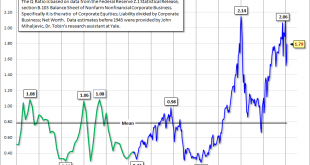Back again with another Monday Message Board. Post comments on any topic. Civil discussion and no coarse language please. Side discussions and idees fixes to the sandpits, please. If you would like to receive my (hopefully) regular email news, please sign up using the following link http://eepurl.com/dAv6sX You can also follow me on Twitter @JohnQuiggin, at my Facebook public page and at my Economics in Two Lessons page Like this:Like Loading...
Read More »r < 0
A few thoughts on the fact that r < 0, where r is the real rate of interest on long-term (< 30 years) debt for developed country governments Situation predates pandemic and has happened despite central bank attempts to resist it, such as abandoned attempt by Fed to raise funds rate in 2019. Extends to corporate bonds as well. Lowest investment grade BBB currently offering 2.38 which implies expected real return (net of inflation and expected loss from default) also below zero....
Read More »Monday Message Board
Back again with another Monday Message Board. Post comments on any topic. Civil discussion and no coarse language please. Side discussions and idees fixes to the sandpits, please. If you would like to receive my (hopefully) regular email news, please sign up using the following link http://eepurl.com/dAv6sX You can also follow me on Twitter @JohnQuiggin, at my Facebook public page and at my Economics in Two Lessons page Like this:Like Loading...
Read More »Different crisis, different times
My latest piece in Inside Story. Standfirst is Has the Coalition learnt the wrong lessons from Margaret Thatcher? Thatcher saw that the existing system has failed and proposed a radical alternative. In that sense, we need to emulate her. We don’t need to trawl through the leftovers of her program: an uninspiring ragbag of policies that turned out to be either unworkable (money supply targeting, for instance) or so politically toxic that they are unsaleable even forty years...
Read More »Intangibles = Monopoly
In a recent post, I pointed out that long-term (30 year) real interest rates on safe (AAA) bonds had fallen to zero, and suggested that this meant the end of capitalism, at least in the sense that the term was understood in classical economics. On the other hand, stock markets have been doing very well. So what is going on? This is a complicated story and I’m still working it out,An important starting point is the fact that the most profitable companies, particularly tech companies,...
Read More »Monday Message Board
Back again with another Monday Message Board. Post comments on any topic. Civil discussion and no coarse language please. Side discussions and idees fixes to the sandpits, please. If you would like to receive my (hopefully) regular email news, please sign up using the following link http://eepurl.com/dAv6sX You can also follow me on Twitter @JohnQuiggin, at my Facebook public page and at my Economics in Two Lessons page Like this:Like Loading...
Read More »Why a Job Guarantee will require higher taxation
Ever since I wrote Work for All with John Langmore back in 1994, I’ve been pushing the idea that a path to full employment requires an expansion of publicly provided services. For about the same length of time, Bill Mitchell has been putting forward similar (but not identical) proposals. At some point in this process, Bill became one of the advocates of what’s called Modern Monetary Theory, which makes the point that taxes don’t (directly) “fund” public expenditure. Rather, they ensure...
Read More »Sandpit
A new sandpit for long side discussions, conspiracy theories, idees fixes and so on. To be clear, the sandpit is for regular commenters to pursue points that distract from regular discussion, including conspiracy-theoretic takes on the issues at hand. It’s not meant as a forum for visiting conspiracy theorists, or trolls posing as such. Like this:Like Loading...
Read More »Now is the time to reduce overlong working hours
That’s the title of an article I published in Independent Australia last week. An important part of it was support for the German Kurzarbeit scheme, which pays most of the wages lost by employees when working hours are shortened due to the recession. There’s a striking contrast with the push by Josh Frydenberg to allow employers to cut hours and wages at will. It’s pretty clear that the days of “we are all in this together” are fast disappearing. Share this:Like this:Like...
Read More »Monday Message Board
Back again with another Monday Message Board. Post comments on any topic. Civil discussion and no coarse language please. Side discussions and idees fixes to the sandpits, please. If you would like to receive my (hopefully) regular email news, please sign up using the following link http://eepurl.com/dAv6sX You can also follow me on Twitter @JohnQuiggin, at my Facebook public page and at my Economics in Two Lessons page Like this:Like Loading...
Read More »
